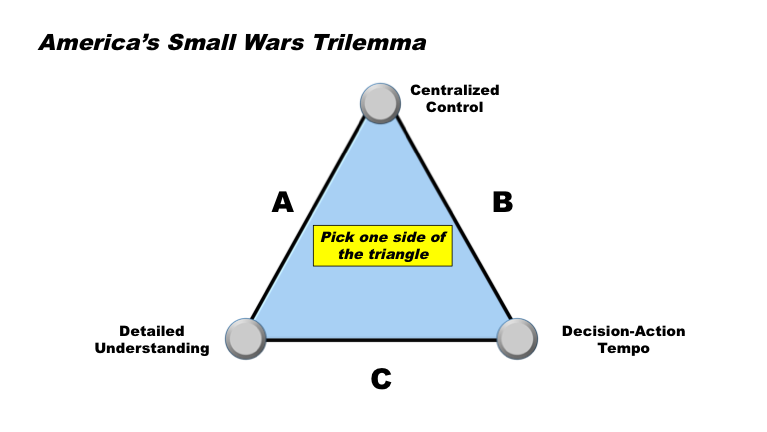
Paratroopers of the U.S. Army's 25th Infantry Division, after executing a joint forcible entry exercise at Joint Base Elmendorf-Richardson, Alaska on Aug. 23, 2016. U.S. Air Force / Justin Connaher
America's National Security Trilemma — and How to Solve It
In fighting small wars, you get to pick only two of these: centralized control, detailed understanding, and acceptable operational tempo. Here's how to choose.
America’s military is the world’s best, say Gen. David H. Petraeus and scholar Michael O’Hanlon. (Some like to call it the finest force the world has ever known.) If that is so, why can’t it win our wars?
The country’s track record since 9/11 has been so dismal, in fact, that senior civilian and military leaders from three major NATO allies have told me in recent months that their faith in American leadership has eroded significantly.
Is our military prowess over-hyped, like the talented athlete who chokes in real matches? Or is military capability ineptly employed, like an all-star player poorly coached by an overwhelmed staff?
The problem is closer to the latter. America has a terrific military. It also has brilliant diplomats, intelligence officials, aid experts, and civil servants across the government. But in recent conflicts, the whole has been less than the sum of its parts – and unequal to the task.
The national security architecture that evolved to help win the Cold War is incapable of waging small, contemporary wars effectively.
America is caught in a trilemma. It must choose between centralized control, detailed understanding of the conflict, and a decision-action tempo sufficient to retain the initiative on the ground. Only two of the three are possible.

As a global power, America has a lot on the plate. If the National Security Council, or NSC, wants to centralize control, it can slowly amass expertise about a far-off conflict, but the decision-action tempo is unlikely to keep pace with events on the ground.
Alternatively, the NSC can make rapid decisions by limiting the time to amass expertise, but such decisions have high risk of unintended consequences.
Finally, if America wants a high decision-action tempo informed by detailed expertise, it cannot realistically micromanage from Washington, D.C.
Here’s why. The NSC consists of four people: The president of the United States, the vice president, the secretary of state, and the secretary of defense. On national security issues they are advised by the chairman of the Joint Chiefs of Staff and supported by heads of the intelligence community and other cabinet secretaries and advisors as the situation warrants. An interagency staff supports the White House, while the two department heads have their internal staff.
All told, roughly 20 people are in the situation room during NSC meetings, less than half of whom have a voice. This same small group of incredibly talented people convenes to discuss issues ranging from space to climate change; nuclear proliferation to humanitarian disasters; the rise of China and provocations of Russia; North Korean belligerence; Iranian nuclear negotiations; the Middle East peace process; the vast proliferation of small wars – and everything in between. These same individuals have domestic policies to address and federal departments to run. In short, they have the bandwidth to do a few, big things well.
Competent prosecution of small wars requires the ability to enact sound and timely decisions in a dynamic and very foreign environment. This requires detailed understanding of the conflict: the fears and interests of local and regional actors; the political, social, economic and cultural subtleties; and how to skillfully integrate elements of national power to protect and advance U.S. interests.
Success also requires the ability to quickly learn and adapt, to capitalize on fleeting opportunities, and to avoid emerging strategic risks. In other words, prosecuting small wars effectively requires the right decision-action tempo informed by detailed expertise of a vastly different part of the world.
The U.S. national security architecture, however, is too centralized and bureaucratic to make and implement expert decisions at the tempo needed to prosecute small wars effectively. Slow failure often results.
There are two ways out of the trilemma.
First, the NSC could put other major issues on the back burner to focus on managing a particular small war. The Bush administration had a laser-focus on Iraq from 2006 to 2008. A former senior White House official told me that probably 80 percent of the foreign policy energy was focused on staving off disaster in that conflict.
There were opportunity costs, however. The financial crisis loomed unmanaged, Afghanistan crept toward disaster, and Russia, China, and North Korea grew more aggressive. Even with such focus, the Bush administration found itself having to accept Iraqi Prime Minister Maliki’s demand for a withdrawal timeline while being unable to prevent his predatory sectarianism – both of which fed the rise of the so-called Islamic State.
The other way out is for the NSC to pick Side C in the triangle above, and then make the best of it. The council can delegate authorities to an interagency strategic headquarters on the ground, an echelon that should replace senior military commands. The NSC would maintain control through policy governance, oversight of strategy, and assessments. The command in-country should develop and implement strategy and have the authorities to make decisions about the application of deployed elements of national power.
Armed combat is only one aspect of waging war. In contemporary wars, military, political, diplomatic, economic and other dynamics interact concurrently rather than sequentially. The political and diplomatic realms are the more decisive ones. Integration on the ground, therefore, is essential for success, but the U.S. continues to be unable to make it work.
Institutionalizing integration could entail an interagency equivalent to the 1986 Goldwater-Nichols Act that forced the military services to work together. Although such change would be painful, it is better than slow and expensive failures in far off places.





